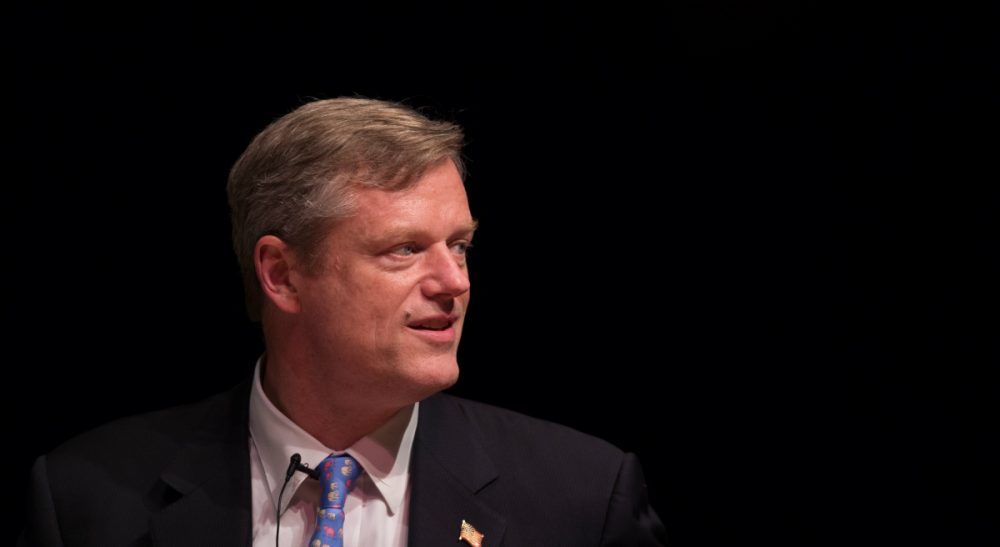Advertisement
Charlie Baker’s Hypocrisy On Child Welfare

Charlie Baker is not the first politician to exploit the suffering of Massachusetts’ most vulnerable children for political gain, but he might well be the brashest.
It takes no small measure of nerve for a public official with a record of callous indifference to the plight of abused and neglected children to impugn the commitment of a woman who has spent her career championing their cause.
A bureaucrat once in charge of the state’s broken child protection system attacking a prosecutor who for decades has given a voice, in and out of court, to the children the state has failed to protect.
Baker, the Republican candidate for governor, refused last week to disavow a campaign ad by his supporters that accuses Attorney General Martha Coakley, his Democratic rival, of ignoring mismanagement at the Department of Children and Families, with fatal results for those in the care of the state agency, previously known as the Department of Social Services.
That’s rich. A bureaucrat once in charge of the state’s broken child protection system attacking a prosecutor who for decades has given a voice, in and out of court, to the children the state has failed to protect.
The Commonwealth Future Independent Expenditure Political Action Committee, which paid for the 32-second television spot, would do well to take a closer look at Baker’s actual record.
In 1991, when Gov. William Weld appointed him undersecretary of Health and Human Services, Baker ignored a legislative subcommittee report, released months earlier, warning that children in foster homes in Massachusetts were at serious risk of abuse and neglect.
A year later, after several high profile abuse cases put the commonwealth’s foster care system under fresh scrutiny, DSS Commissioner Gerald W. Robinson complained that "the magnitude of the issues and the need to reform this agency have been trivialized" by the Weld administration. Robinson resigned, Weld promoted Baker to secretary of Health and Human Services, and nothing changed at DSS.
Months later, when a report by Andersen Consulting cited a "climate of fear, mistrust and defensiveness" at DSS that required "immediate, comprehensive, decisive and visible remedial action," Baker acted decisively all right. He kicked the issue to yet another study committee.
When that Special Commission on Foster Care released its 280-page report calling DSS a "crisis-driven, reactive bureaucracy," Baker put it on a shelf where it gathered dust for two years until a fresh round of horrific deaths and abuse cases prompted the Senate Committee on Post Audit and Oversight to launch its own investigation of the state’s foster care system.
Advertisement
Did Baker use his influence as secretary of Administration and Finance to push for more funding for the 14,000 children then in the care of DSS? Did he argue that fiscal discipline was no substitute for fundamental decency? No.
That committee found what every other investigative panel has found since the state’s child protection agency was established in 1980 — the work of its social workers is undermined by burdensome caseloads, overcrowded foster homes and inadequate record-keeping.
By 1994, as Weld’s new chief budget officer, Charlie Baker was in a position to address those problems. Did Baker use his influence as secretary of Administration and Finance to push for more funding for the 14,000 children then in the care of DSS? Did he argue that fiscal discipline was no substitute for fundamental decency? No.
In 1995, in a period of eight months, eight children under the supervision of the state Department of Social Services died of abuse or neglect.
In the wake of those deaths, Weld did ask the Legislature for an additional $5.1 million to hire 127 social workers and 25 DSS supervisors. A year later, only 18 social workers had been hired, and DSS was required to send the unspent money to the general fund, where Weld used it to help finance an election-year tax cut. He was running for the U.S. Senate in 1996, and, like his protégé, Charlie Baker, he thought no one would check the record to see if there was any relationship between what he said about protecting vulnerable children and what he actually did.
Related:
